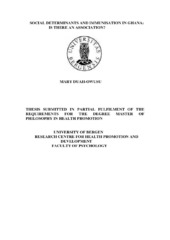Social determinants and immunisation in Ghana: is there an association?
Abstract
This study investigates the relationship between social determinants of health and immunisation using data from the 2003 Ghana DHS (Demographic and Health Survey). Classical and alternative social determinants of health were identified using the Sustainable livelihood framework. The classical social determinants comprise of education, occupation and wealth. The alternative social determinants in this study include specific factors such as source of drinking water and the possession of a radio. The analyses utilised data from 5691 women who took part in the survey. It compared a national sample with the three northern-most regions rural sub-sample. These samples were women who were permanent residents of a household with a first born child below five years. The weighted national and three northern-most rural regions usual resident extracted sample numbered 2460 and 462, respectively. Bivariate correlation analyses and logistic regression analyses were carried out in both samples. The analyses yielded the following results. Being fully immunised and having a health card was associated with ethnicities in the rural sample. Being fully immunised and having a health card in the national sample was, however, associated with both the classical and alternative social determinants of health. The results of this study suggest that the classical determinants of health do not explain the immunisation status of children in very poor rural localities in the northern-most regions of Ghana. It should be noted that separate wealth indices were not originally constructed for rural and urban areas.
Publisher
The University of BergenCopyright
Copyright the author. All rights reservedThe author
